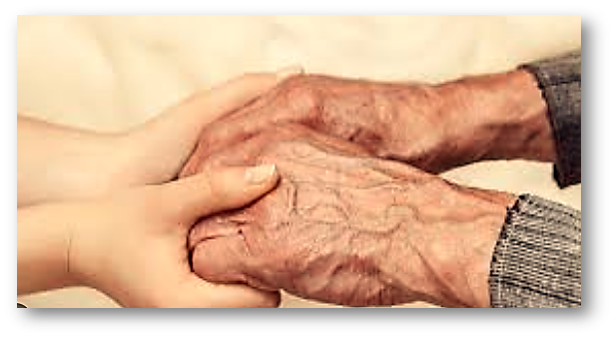Aging is the process of growing older, which is a natural part of life. As we age, our bodies and minds go through various changes, some of which can be positive and some of which may be negative. Some common physical changes that can occur with aging include wrinkles, graying hair, and a decrease in muscle mass and bone density. Cognitive changes can also occur with aging, such as a decline in memory and processing speed.
Many factors can influence the aging process, including genetics, lifestyle habits, and environmental factors. Some people may experience aging more quickly or more slowly than others, and the way that aging affects an individual can vary greatly.
Despite the inevitable changes that come with aging, it is possible to promote healthy aging by adopting healthy habits, such as eating a balanced diet, getting regular exercise, and engaging in mental and social activities. Many people also find it helpful to focus on maintaining a positive outlook and finding joy and fulfillment in life as they age.
STATISTICS OF AGING

There are many statistics related to aging, and these statistics can vary depending on the population being studied and the specific aspects of aging being considered. Here are a few statistics related to aging:
- The global population of people aged 60 years or older is expected to reach 2.1 billion by 2050.
- The average life expectancy in the United States is 78 years for men and 82 years for women.
- The prevalence of chronic diseases increases with age, with approximately 80% of older adults in the United States living with at least one chronic condition.
- The prevalence of mental health conditions also increases with age, with approximately 20% of older adults in the United States experiencing some form of mental health condition.
- The number of older adults living alone is expected to increase in the coming years, with approximately 28% of older adults in the United States living alone in 2015.
- The number of older adults participating in the labor force has been increasing in recent years, with approximately 18% of older adults in the United States participating in the labor force in 2020.
These statistics illustrate the diversity and complexity of aging and the importance of addressing the various needs and challenges faced by older adults.
AGING IS A NATURAL PROCESS!!

The medical process of aging refers to the changes that occur in the human body as a person grows older. These changes can affect various systems and functions within the body, including the cardiovascular, respiratory, immune, and nervous systems.
Some common physical changes that can occur with aging include:
- The decline in muscle mass and bone density
- Decrease in flexibility and mobility
- Changes in skin, hair, and nails
- Changes in vision and hearing
- Changes in organ function, such as the heart, lungs, and kidneys
- Changes in hormone production and metabolism
In addition to physical changes, aging can also affect cognitive function and mental health. Some people may experience a decline in memory and processing speed, while others may develop conditions such as dementia or Alzheimer’s disease.
While aging is a natural process, various factors can influence how quickly or slowly a person ages. These include genetics, lifestyle habits, and environmental factors. Maintaining a healthy lifestyle, including a balanced diet, regular exercise, and engaging in mental and social activities, can help promote healthy aging and reduce the risk of age-related diseases.
AGING AND PHYSICAL ACTIVITIES

Physical activity is important for people of all ages, including seniors. Regular physical activity can help seniors maintain their strength, flexibility, and balance, which can reduce the risk of falls and other injuries. It can also help improve mental health and mood.
Some examples of physical activities that seniors can do include walking, swimming, cycling, and yoga. Seniors need to choose activities that are appropriate for their fitness level and start slowly, gradually increasing the intensity and duration of their workouts as they become more comfortable.
Seniors should also be mindful of any chronic health conditions they may have, and talk to their healthcare provider before starting a new physical activity program. It’s also a good idea to wear appropriate clothing and footwear and to warm up and cool down before and after physical activity.
WORKOUT
In general, seniors should aim for at least 150 minutes of moderate-intensity physical activity or 75 minutes of vigorous-intensity physical activity per week, as well as muscle-strengthening activities at least two days per week. However, every individual is different, and seniors need to talk to their healthcare provider about what level of physical activity is right for them.
AGING AND HEALTHY DIET
A healthy diet is important for people of all ages, including seniors. As we age, our bodies may have different nutritional needs, and it’s important to make sure we are getting the nutrients we need to stay healthy.
Here are some tips for seniors to follow a healthy diet:
Eat a variety of foods:
Seniors should aim to eat a variety of fruits, vegetables, whole grains, lean proteins, and healthy fats to ensure they are getting a balance of nutrients.
Stay hydrated:
It’s important for seniors to drink enough fluids, especially in hot weather or when they are physically active.
Choose nutrient-dense foods:
Seniors may need to be more mindful of their caloric intake, so it’s important to choose nutrient-dense foods that provide a lot of nutrients for relatively few calories.
Limit added sugars and saturated fats:
Seniors should aim to limit their intake of added sugars and saturated fats, which can contribute to weight gain and other health problems.
Consider supplements:
If a senior has trouble getting all the nutrients they need from their diet, they may want to consider taking supplements under the guidance of a healthcare provider.
Seniors need to talk to their healthcare provider or a registered dietitian if they have any questions or concerns about their diet. They can provide personalized recommendations based on a senior’s individual needs and health status.
AGING AND SLEEP ROUTINE
Getting enough sleep is important for overall health and well-being, and this is true for seniors as well. Seniors may need 7-9 hours of sleep per night, although the exact amount of sleep an individual needs can vary.
Here are some tips for seniors to maintain a healthy sleep routine:
Stick to a consistent sleep schedule:
Going to bed and waking up at the same time every day can help regulate the body’s sleep-wake cycle and improve sleep quality.
Create a relaxing bedtime routine:
A relaxing bedtime routine, such as taking a warm bath or reading a book, can help seniors wind down and prepare for sleep.
Make the bedroom conducive to sleep:
Seniors should aim to create a sleep-friendly environment by keeping the bedroom cool, dark, and quiet, and using a comfortable mattress and pillows.
Avoid stimulants before bed:
Caffeine and alcohol can interfere with sleep, so seniors should avoid consuming these substances for several hours before bedtime.
Consider sleep aids:
If a senior has trouble falling or staying asleep, they may want to talk to their healthcare provider about whether sleep aids might be appropriate.
If a senior is experiencing chronic sleep problems or difficulty falling or staying asleep, it’s a good idea to talk to their healthcare provider for further evaluation and guidance.
AGING AND REGULAR CHECKUPS
Aging is a natural process that occurs over time, and it is accompanied by physical and biological changes. As we age, our bodies become less efficient at repairing and regenerating cells. which can lead to an increased risk of certain health conditions. It is important to maintain good health by following a healthy lifestyle. which includes eating a balanced diet, getting regular exercise, getting enough sleep, and avoiding tobacco and excessive alcohol consumption.
Regular checkups
Regular checkups are an important part of maintaining good health as we age. These checkups can help detect potential health problems early on when they are most treatable. During a regular checkup, your healthcare provider will generally assess your overall health, including your vital signs, physical examination, and any necessary screenings or tests. Depending on your age, gender, and other risk factors, your healthcare provider may recommend certain screenings or tests to check for specific health conditions. For example, as we age, we may be at increased risk for certain conditions such as high blood pressure, high cholesterol, and diabetes, and may need to undergo regular screenings for these conditions.
It is important to talk to your healthcare provider about what type of regular checkups are recommended for you and to make sure you get these checkups on a regular basis. By doing so, you can help ensure that you are aware of any potential health issues, and can take steps to address them as needed.
AGING AND MENTAL HEALTH
Aging is a natural process that occurs over time, and it is accompanied by physical and biological changes. As we age, it is common to experience changes in our mental health, such as changes in our mood, cognitive function, and overall mental well-being.
Maintaining good mental health is important at all stages of life, and it becomes increasingly important as we age. There are several factors that can affect our mental health as we age, including physical and emotional changes, social isolation, and life events. It is important to be aware of these factors and to take steps to maintain good mental health.
If you are experiencing changes in your mental health as you age, it is important to talk to a healthcare provider. They can help you to identify any potential underlying causes and provide appropriate treatment.
AGING AND SOCIAL CONNECTIONS

Social connections are an important part of maintaining good mental and physical health as we age. Research has shown that. social connections can help to improve mood, reduce the risk of depression and anxiety, and improve overall well-being. As we age, it is common to experience changes in our social connections, such as the loss of loved ones, changes in our living situations, or changes in our ability to participate in certain activities. It is important to be aware of these changes and to take steps to maintain and strengthen our social connections.
Some ways to maintain and strengthen social connections as we age include:
Stay in touch with friends and loved ones:
Make an effort to stay in touch with friends and loved ones. and to participate in activities that you enjoy together.
Join a club or community group:
Participating in a club or community group can provide opportunities to meet new people and engage in activities that you enjoy.
Volunteer:
Volunteering can be a great way to connect with others and make a positive impact in your community.
Participate in online social groups or communities:
Online groups and communities can provide opportunities to connect with others who share your interests.
It is important to find activities and social connections that are meaningful and enjoyable to you. By doing so, you can help to maintain and strengthen your social connections as you age. If you are having difficulty maintaining social connections, it may be helpful to talk to a healthcare provider or a mental health professional. They can help you to identify potential underlying causes and provide appropriate support.
Keywords: Aging gracefully, Anti-aging tips, Aging and Health, Aging and mental health, Aging and social connections Aging and lifestyle choices, aging and chronic diseases, Aging and memory loss, Aging and caregiving, Aging and retirement,
REFERENCES:
- Harman, D. (1981). The aging process. Proceedings of the National Academy of Sciences, 78(11), 7124-7128.
- Harman, D. (2001). Aging: overview. Annals of the New York Academy of Sciences, 928(1), 1-21.
- Kinsella, K. G., & Velkoff, V. A. (2001). An aging world: 2001 (No. 1). Bureau of Census.
- Troen, B. R. (2003). The biology of aging. Mount Sinai Journal of Medicine, 70(1), 3-22.

